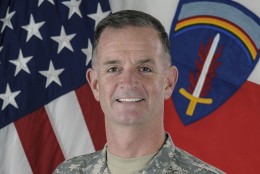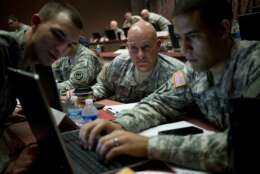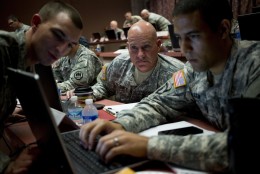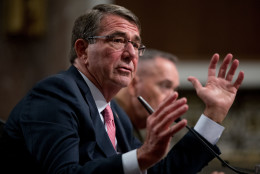Defense
-
Patrick Murphy, the Undersecretary of the Army, previously served as a congressman from Pennsylvania, and is an Army veteran. At the Association of the U.S. Army's conference, he tells Jared Serbu on Federal Drive with Tom Temin about a topic he's devoted a significant amount of attention to since taking office this past January — the Army's Soldier for Life initiative.
October 04, 2016 -
Lt. Gen. Stephen Lanza is the commander of the Army's I Corps, based at Joint Base Lewis-McChord, Washington, but heavily engaged throughout the Pacific. He joined Jared Serbu on Federal Drive with Tom Temin at the Association of the U.S. Army conference with an update on some of I Corps' activities over the past year.
October 04, 2016 -
The Army's Rapid Capabilities Office is barely a month old, but Army leaders already have a strong idea of what they want the new organization to pursue. Early priorities are electronic warfare, cyber, and position, navigation and timing. Maj. Gen. Walter Piatt, the office's deputy director for operations, joined Jared Serbu on Federal Drive with Tom Temin at this week's Association of the U.S. Army conference here in Washington with a preview of some of the work ahead.
October 04, 2016 -
Welcome to the #FedFeed, a daily collection of federal ephemera gathered from social media and presented here for your enjoyment.
October 03, 2016 -
The Army is changing and with it are the demands on its individual soldiers. Army Chief of Staff Gen. Mark Milley explained what characteristics the next generation soldier will hold.
October 03, 2016 -
The Air Force is looking for creative ways to free up airmens’ time to focus on their primary missions — and spend time with their families. The latest idea is to cut back on the amount of mandatory computer-based training airmen have to endure.
October 03, 2016 -
Saying it’s seeking more inclusion and a broader range of experience within its enlisted ranks, the Navy is moving ahead with the latest in a series of changes to its personnel system.
October 03, 2016 -
Lt. Gen. Gina Grosso says that the biggest challenge in the already complex problem of developing the Air Force's cyber workforce is the civilian portion. That's because the federal government isn't quite sure who is or isn't cyber personnel.
October 03, 2016 -
Congress bought itself more time to work out a fiscal 2017 budget by passing a continuing resolution, but an intractable fight remains on the defense spending front.
September 29, 2016 -
A prominent Republican on the House Armed Services Committee is the newest lawmaker to ask the White House for a budget request to pay for additional troops in Afghanistan.
September 29, 2016 -
The Defense Department's failing space acquisitions are getting attention from lawmakers.
September 28, 2016 On this week’s edition of On DoD: Most service members and U.S. citizens deployed overseas will have to account for the inherent delays involved in a two-way mailing process to make sure their ballots are counted…
September 28, 2016-
When it comes to the technological superiority of the Army’s battlefield equipment, officials worry it’s on the wane because of a sort of a perfect storm
September 28, 2016 -
The Defense Department will ask Congress for another wartime find when lawmakers come back from their fall recess.
September 27, 2016 -
Defense Secretary Ash Carter is planting so-called innovation centers all over. First came San Jose, then Boston and now, Austin Texas. Is he overdoing it? Will these DIUXs produce tangible results? And what do they mean for companies in the D.C. region. For some possible answers, Federal Drive with Tom Temin turns to Jonathan Aberman, chairman of Amplifier Ventures.
September 27, 2016














